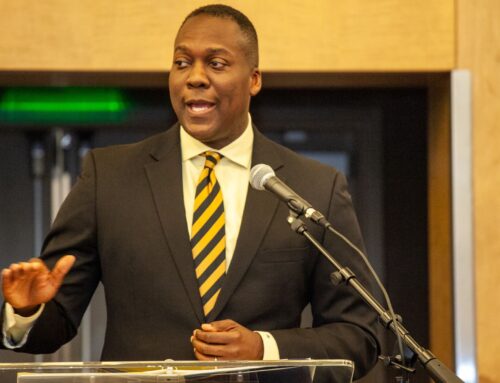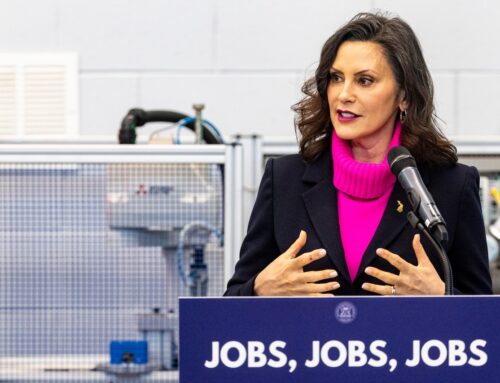Mark Zuckerberg is building a tech super lab. Don’t ask what for
July 27, 2025
Mark Zuckerberg is building a tech super lab. Don’t ask what for
Meta’s chief is spending big on data centres, one the size of Manhattan, to create a monster that no one can rival. Is ‘a new era for humanity’ really the goal?
Saturday July 26 2025, 12.20pm, The Sunday Times
On July 4, Mark Zuckerberg donned a head-to-toe bald eagle costume and hopped on a hoverboard that sliced through the deep blue waters of Lake Tahoe at very high speed. “Is this the stupidest thing we’ve done so far?” he is heard to say through the costume.
It may not be.
Ten days after his Independence Day stunt in California, the Meta billionaire took to his social media app, Threads, to announce a scorched-earth scheme to dominate artificial intelligence. His plan, he said, was to invest “hundreds of billions of dollars” in AI infrastructure — data centres. A single site, dubbed Hyperion, could be nearly as large as the island of Manhattan and require 5GW of power — enough juice to power five million British homes.
Mark Zuckerberg went surfing as an American bald eagle on Lake Tahoe to provide more hype for Meta
INSTAGRAM/@ZUCK
For context, Britain’s newly opened Isambard-AI “supercomputer” at Bristol University is 5MW — a thousandth of the size of Zuck’s planned mega-site.
The Facebook founder’s posts were part recruiting effort for his new unit, called Meta Superintelligence Labs, and part scare tactic.
“Meta Superintelligence Labs will have industry-leading levels of compute and by far the greatest compute per researcher. I’m looking forward to working with the top researchers to advance the frontier,” he said. “We have the capital to do this.”
Put another way: we are going to turn all of our social media cash into an AI leviathan with which virtually no one can compete. His shot across the bow of rivals came amid reports that he was personally emailing top AI coders with offers ranging from a few million to, ahem, $1.25 billion (£930 million), to lure them from rivals such as OpenAI, Google and Apple. And it has worked.
The 41-year-old tech boss, whose company will report its second-quarter results on Wednesday, has with blinding speed assembled a team of top AI talent. They include Alexandr Wang, former chief executive of Scale AI; Nat Friedman, former boss of the software development platform GitHub; Daniel Gross, ex-chief of AI company Safe Superintelligence; and Ruoming Pang, a former AI executive at Apple (and recipient of a reported $200 million pay packet).
Alexandr Wang
DAVID PAUL MORRIS/GETTY IMAGES
Andrew Bosworth, Meta’s technology chief, said last month: “The market is setting a rate here for a level of talent which is really incredible and kind of unprecedented in my 20-year career as a technology executive.”
Andrew Bosworth
DAVID PAUL MORRIS/GETTY IMAGES
All of which leads to two questions: what is Zuck’s goal, and will his wall of money get him there?
His new “north star” appears to be creating “personal superintelligence”— machines smarter than any human. What that means for Meta as a business, or for the average person, is vague. In a recent internal memo announcing the artificial intelligence lab, he said: “As the pace of AI progress accelerates, developing superintelligence is coming into sight. I believe this will be the beginning of a new era for humanity, and I am fully committed to doing what it takes for Meta to lead the way.”
A new era for humanity? If he’s right, then perhaps it makes sense to offer a single coder $1.25 billion over four years, as rumoured by Daniel Francis, founder of Abel, a developer of AI for police forces. “Was informed of a $1.25 billion offer for four years,” Francis tweeted last week. “New highest I’ve seen. Guys, what the hell is going on?”
Meta declined to comment, though one gets the sense that Zuck rather likes this type of publicity.
Zuckerberg’s strategy has its critics, but he can afford to ignore them
JASON HENRY/GETTY IMAGES
His creation of a shiny new division with a lofty goal is canny. The best people want to work on the most ambitious projects; a species-altering technological advance ticks that box. And Zuck drove home the point that he has what most of his competitors don’t: a core business that means he can self-fund his grand project.
Rivals such as OpenAI, Elon Musk’s Grok chatbot and Anthropic, maker of the Claude chatbot, are losing vast sums of money. They exist entirely at the pleasure of their investors. If this is a knife fight, Zuckerberg has just shown up with a bazooka on his shoulder. The only company in the consumer AI race who can match Zuck’s bucks is Google.
That said, money alone is not enough. Tijmen Blankevoort, a former member of Meta’s 2,000-strong AI team, recently published a blistering post on an internal message board on his way out of the company. The missive, first reported by tech publication The Information, slammed Meta’s “culture of fear”, which has spread through the company like a “metastatic cancer”. He added: “You’ll be hard pressed to find someone that really believes in our AI mission. To most, it’s not even clear what our mission is.”
• The Times and Sunday Times Tech Summit 2025
His screed appeared to be borne of frustration at the development pace and lacklustre performance of Llama, Meta’s flagship AI model. And Zuckerberg, clearly, shared those views, which sent him on his spending spree.
Blankevoort’s post came before the flurry of recruits and creation of the new lab.
If Zuck’s gambit works, there are innumerable ways in which AI could alter how Meta operates as a business. For one, Zuckerberg predicted earlier this year that 2025 will be the year that AI will approximate a “good, mid-level engineer”. For an employer of 77,000 humans, that could lead to marked productivity improvements, and potentially slow hiring or job cuts.
Microsoft’s Satya Nadella has shown the way: he has pushed through 15,000 redundancies amid record-setting financial performance.
Satya Nadella, chief executive of Microsoft
LUCY YOUNG FOR THE TIMES
And then there is the advertising industry, which the Meta boss hopes to, in effect, completely destroy. In a recent interview with tech blog Stratechery, he laid out his vision to automate the entire advertising process — from the creation of ads themselves, to targeting, delivery and monetisation.
“We’re going to get to a point where you’re a business, you come to us, you tell us what your objective is, you connect to your bank account,” he said. “You don’t need any creative, you don’t need any targeting demographic, you don’t need any measurement, except to be able to read the results that we spit out.
“I think that’s going to be huge. I think it is a redefinition of the category of advertising.”
The last leg of the stool is Meta’s 3.4 billion users. Zuckerberg likes to brag that his company, owner of Instagram, Facebook, WhatsApp and Threads, is the only one in the world whose AI is being used by more than a billion people. This is technically true: Meta has jammed its AI button into the middle of all its apps.
• I built a game in minutes with AI. The thrill took me back years
But really, this comes down to a question of invention and, more pointedly, taste.
Can Zuck turn all of that expensively acquired brain power into products people want? In answer to that question, I offer an exhibit: the metaverse.
Remember that? Cast your mind back to 2021. Zuckerberg laid out a bold vision for a techno-utopian dreamland where we would don virtual-reality goggles and show up as legless cartoon avatars in virtual meeting rooms full of legless colleagues to go over the latest quarterly numbers.
So excited was he by this fantasy that he renamed his company. In the past four years, the Reality Labs division — the unit responsible for delivering that vision — has lost $56 billion. And we are no closer to that particular fever dream.
• Inside Mark Zuckerberg’s $173 billion midlife crisis
In Zuck’s favour this time is that AI is, already, showing itself to be useful and hugely popular — if also terrifying.
Unlike with the metaverse — an invention no one asked for, nor wanted — the demand for AI is vast and growing. But does Zuck have the taste to create a product people want? There are some things that money can’t buy.
The Times and Sunday Times Tech Summit returns this October — exploring the UK’s path to becoming a true tech superpower. Register your interest here.
Search
RECENT PRESS RELEASES
Related Post









